Career Advice Letter
Subject: Career Advice Letter
Dear [Recipient],
I hope this letter finds you well. I am writing to offer some career advice and guidance based on my own experiences and knowledge. The world of work can be both exciting and challenging, and I believe that thoughtful consideration and planning are key to achieving a fulfilling and successful career.
1. Self-Reflection: Take the time to reflect on your passions, strengths, and interests. Identifying what you truly enjoy and excel at will lead you to a career path that aligns with your values and brings you a sense of purpose and satisfaction.
2. Set Clear Goals: Establish both short-term and long-term career goals. Having clear objectives will help you stay focused and motivated, and it will be easier to navigate the various opportunities that come your way.
3. Skill Development: Continuously invest in your skillset. Seek out opportunities for learning and growth, whether through formal education, workshops, online courses, or hands-on experience. Adapting to the changing job market requires a willingness to evolve and stay current.
4. Networking: Build and maintain professional relationships. Networking can open doors to new opportunities, provide valuable insights, and even lead to mentorship. Attend industry events, join online communities, and engage with peers and professionals in your field.
5. Embrace Challenges: Embrace challenges and view them as opportunities to learn and grow. Sometimes, the most significant advancements in your career can come from overcoming obstacles and stepping out of your comfort zone.
6. Work-Life Balance: Strive for a healthy work-life balance. While dedication and hard work are essential, it's equally vital to take care of your physical and mental well-being. Burnout can hinder your progress and negatively impact your performance.
7. Seek Guidance: Don't hesitate to seek advice from experienced professionals or career counselors. They can offer valuable insights, identify potential blind spots, and provide guidance in making important career decisions.
8. Adaptability: The job market is dynamic, and industries can change rapidly. Be open to adapting your career plans as needed. Sometimes, the best opportunities arise in unexpected places.
9. Embrace Failure: Failure is a natural part of the learning process. Don't be disheartened by setbacks; instead, use them as opportunities to grow, learn, and improve.
10. Follow Your Instincts: Trust your instincts and follow your heart. When faced with difficult decisions, listen to your inner voice, as it often knows what is right for you.
Remember, a career is not just about financial success; it's about finding fulfillment and meaning in the work you do. Stay true to yourself, stay resilient, and continue to pursue your dreams with passion and determination.
I wish you all the best on your journey to a rewarding and successful career. If you ever need further advice or have any questions, don't hesitate to reach out.
Sincerely,
[Your Name]
[Your Title/Profession]
[Contact Information]
Career Transition Advice Letter
Subject: Guidance on Your Career Transition
Dear [Recipient's Name],
I hope this message finds you well. I wanted to reach out regarding your interest in transitioning to [new field/industry]. Having worked in [relevant field] for [number] years, I believe I can offer some valuable insights that might help guide your decision.
First, I commend you for considering this move. Career transitions require courage and self-awareness, and the fact that you're seeking advice shows you're approaching this thoughtfully. Based on what you've shared about your background in [current field] and your interest in [target field], I see several transferable skills that will serve you well, particularly your [specific skills].
However, I'd be remiss if I didn't mention some challenges you may face. The [target industry] typically requires [specific qualifications/experience], and there may be an initial adjustment period. I recommend you consider [specific suggestions: courses, networking, informational interviews] to bridge any gaps.
I'd be happy to discuss this further over coffee or a call. Please feel free to reach out if you have specific questions about [relevant topics].
Best regards,
[Your Name]
Career Advancement Advice Letter - Formal
Subject: Professional Development Recommendations
Dear [Recipient's Name],
Thank you for seeking my counsel regarding your career advancement goals at [Company/Industry]. I have given considerable thought to your situation and would like to share my professional assessment.
Your current trajectory demonstrates strong potential, particularly in [specific areas]. To position yourself for [desired role/promotion], I recommend focusing on three key areas:
Strategic Visibility: Ensure your contributions are recognized by key decision-makers. This means volunteering for high-visibility projects, presenting at company meetings, and documenting your achievements quantifiably.
Skill Development: The next level requires proficiency in [specific skills]. I suggest pursuing [certifications/training/courses] and seeking opportunities to apply these skills in your current role.
Relationship Building: Cultivate relationships with mentors and sponsors who can advocate for you. This includes leaders in [departments/teams] who influence promotion decisions.
Regarding timeline, promotions in your organization typically occur during [specific periods]. I recommend initiating conversations with your manager about your aspirations at least [timeframe] in advance.
I'm confident that with focused effort, you can achieve your goals. Please don't hesitate to reach out as you progress.
Sincerely,
[Your Name]
[Title]
Career Choice Advice Email - Casual
Subject: Thoughts on Your Career Dilemma
Hey [Name],
Thanks for asking my opinion on the whole [Company A] vs [Company B] situation. I know these decisions can be stressful, so I'll share what I'm thinking.
From what you've told me, [Company A] offers better pay and the title sounds impressive, but [Company B] seems like it aligns more with where you want to be in five years. Here's my two cents: early in your career, growth potential and learning opportunities often matter more than immediate salary. That said, if you have student loans or financial pressures, the extra money might be worth it.
Some things to consider: What's the company culture like? Who will you be learning from? How's the work-life balance? Will you actually enjoy the day-to-day work? Sometimes we get so focused on the prestige or money that we forget we'll be spending 40+ hours a week doing this.
My gut says [specific recommendation], but ultimately you know your priorities best. Trust yourself—you've got good instincts.
Let me know if you want to grab lunch and talk through it more!
[Your Name]
Career Path Advice Letter - Mentorship Style
Subject: Career Path Discussion
Dear [Recipient's Name],
It was great catching up last week and hearing about your career aspirations. I've been thinking about your question regarding whether to pursue [Option A] or [Option B], and I wanted to share some perspectives based on my own journey.
When I was at a similar crossroads [X] years ago, I chose [your choice], and while I don't regret it, I learned some important lessons along the way. The path you choose will shape not just your resume, but your daily experience, your professional network, and your long-term opportunities.
Here's what I wish someone had told me: There's rarely a "wrong" choice, but there are choices that align better with your values and goals. You mentioned valuing [specific values—work-life balance, innovation, impact, etc.]. Based on that, [specific path] might be more fulfilling because [reasons].
That said, [alternative path] offers advantages in [specific areas] that shouldn't be dismissed. If you decide to go that route, I'd suggest [specific strategies to maximize the opportunity].
I'm attaching some resources that might help, and I'm always here if you want to brainstorm further. Remember, careers aren't linear—there's room to pivot and adjust as you learn more about yourself.
Warmly,
[Your Name]
Industry-Specific Career Advice Email
Subject: Breaking into [Specific Industry]
Dear [Recipient's Name],
I was excited to hear you're interested in entering [specific industry]. As someone who has worked in this field for [duration], I'd like to share some practical advice that might help you navigate your entry.
The [industry] landscape has changed significantly in recent years. What used to require [old requirements] now demands [new requirements]. The most successful new entrants I've seen share these characteristics: [specific traits/skills].
Here's a realistic roadmap for breaking in:
Start by building foundational knowledge through [specific resources, courses, or certifications]. Don't skip this step—industry jargon and fundamental concepts are essential for credibility.
Gain practical experience, even if unpaid initially. Consider [specific opportunities: internships, volunteer projects, freelance work]. Your portfolio matters more than your resume in this field.
Network strategically. Attend [specific events, join specific organizations, participate in online communities]. This industry values relationships and referrals heavily.
Be prepared for [specific challenges unique to the industry]. Many newcomers underestimate [particular aspect] and become discouraged.
The timeline for breaking in typically ranges from [timeframe], depending on your background and effort level. Stay persistent—rejection is part of the process.
I'd be happy to introduce you to some contacts if you're serious about pursuing this. Let me know how I can help.
Best,
[Your Name]
Salary Negotiation Advice Email - Straightforward
Subject: Advice on Your Offer Negotiation
Hi [Name],
Congratulations on the offer! Now let's talk about negotiating it properly.
First, the good news: you have leverage. They've already decided they want you, which means you're in a strong position. Don't let fear or gratitude prevent you from advocating for yourself.
Based on the offer of [amount] for [position] in [location], here's my assessment: [market analysis—above/below/at market rate]. Given your [experience level and specific skills], you have room to negotiate for [specific range or benefits].
Here's how to approach it:
Email them within [timeframe] expressing enthusiasm but requesting [specific ask]. Use language like "Based on my research and experience, I was expecting compensation in the range of [amount]" rather than asking "Is there flexibility?"
If they can't move on base salary, negotiate other elements: signing bonus, stock options, vacation time, remote work flexibility, professional development budget, or earlier performance review.
Don't accept immediately even if they meet your number. Thank them and say you'll respond within 24-48 hours. This prevents buyer's remorse and shows you're thoughtful.
Remember: the worst they can say is no, and they won't rescind the offer for professional negotiation. Companies expect it.
You've got this. Let me know how it goes!
[Your Name]
Career Crisis Advice Letter - Heartfelt
Subject: You're Not Alone in This
Dear [Name],
I received your message about feeling stuck and unfulfilled in your current role, and I want you to know that what you're experiencing is more common than you think. Career dissatisfaction can feel isolating, but you're not alone, and there are paths forward.
First, let me acknowledge that what you're feeling is valid. Spending years working toward something only to realize it's not what you want is genuinely difficult. It's okay to feel disappointed, frustrated, or uncertain about the future.
From what you've shared, it sounds like [specific issues: lack of growth, misalignment with values, burnout, toxic environment] are the core problems. The question is whether these can be addressed in your current situation or whether it's time to explore alternatives.
Before making any drastic decisions, I encourage you to: Give yourself time to reflect when you're not in crisis mode. Burnout can cloud judgment. Talk to people outside your immediate circle who can offer fresh perspectives. Explore what fulfillment means to you now—it may have changed since you started this career.
If you decide change is necessary, remember that career pivots are increasingly normal. Your experience isn't wasted—it's foundation for what comes next.
I'm here to support you through this, whether that means being a sounding board, reviewing your resume, or connecting you with people in fields you're considering. Please reach out anytime.
With care and confidence in you,
[Your Name]
Entrepreneurship Career Advice Letter
Subject: Thoughts on Your Entrepreneurial Plans
Dear [Recipient's Name],
Thank you for sharing your business concept with me. I appreciate your trust in seeking my perspective on leaving [current employment] to pursue entrepreneurship.
Let me be direct: starting a business is one of the most challenging and rewarding things you can do. Your idea for [business concept] has merit, particularly the [specific strength of the idea]. However, success requires more than a good idea—it demands execution, resilience, and often, financial runway.
Before taking the leap, address these critical questions: Do you have sufficient savings to sustain yourself for at least [timeframe] without income? Have you validated your concept with potential customers, or is this still theoretical? Do you have the skills to handle all aspects of the business initially, or will you need partners/employees? What's your contingency plan if this doesn't work out?
If you're committed to this path, I recommend a phased approach. Start building your business while maintaining your current job, even if it means evenings and weekends. This allows you to test viability without financial pressure. Once you're generating [specific milestone: revenue amount, customer base], then consider going full-time.
The entrepreneurial journey isn't for everyone, and there's no shame in deciding it's not right for you. But if this is truly your calling, the regret of not trying may outweigh the risk of failure.
I'm happy to discuss specific aspects of your business plan in more detail. My door is always open.
Regards,
[Your Name]
What is a Career Advice Letter and Why Does It Matter
A career advice letter is a formal or informal communication in which someone with professional experience provides guidance, recommendations, or perspectives to help another person make career-related decisions. These letters serve multiple purposes: they document thoughtful counsel, create accountability for both parties, and provide the recipient with a reference point they can revisit when making difficult decisions.
The value of a career advice letter extends beyond the immediate guidance offered. It demonstrates that the sender cares about the recipient's professional development and is willing to invest time and thought into their success. For the recipient, having advice in written form allows for careful consideration and reflection, particularly during emotionally charged career moments when verbal conversations might be forgotten or misremembered.
When Should You Send a Career Advice Letter
Career advice letters are appropriate in numerous scenarios:
- When a colleague, mentee, or friend explicitly requests your input on a career decision
- After an informational interview where someone seeks guidance about entering your field
- When you observe someone at a career crossroads and want to offer unsolicited but helpful perspective
- Following a significant career event (promotion, job offer, termination) that affects someone in your network
- When someone is considering a career change and you have relevant experience to share
- During performance review periods when employees seek advice on advancement
- When a recent graduate or career starter asks for direction on building their professional path
- After you've observed patterns in someone's work that warrant developmental feedback
- When someone faces a difficult choice between competing opportunities
- In response to someone sharing career frustrations or dissatisfaction with their current situation
Who Should Write Career Advice Letters
The most effective career advice letters come from individuals with credibility and relevant experience:
- Direct managers or supervisors who understand the recipient's performance and potential
- Mentors with established relationships and knowledge of the recipient's goals
- Industry veterans who can speak to career trajectories and market realities
- Professionals who have navigated similar transitions or challenges successfully
- Colleagues with lateral perspective on different roles or departments
- Entrepreneurs who can advise on starting businesses or freelancing
- Career coaches or counselors with expertise in professional development
- Former managers or professors who have maintained relationships with mentees
- Peers slightly ahead in their careers who recently faced similar decisions
- Human resources professionals with insight into organizational dynamics and opportunities
To Whom Should Career Advice Letters Be Addressed
Career advice letters can be directed to various recipients depending on the situation:
- Junior colleagues seeking guidance on professional growth
- Friends or family members making career decisions
- Former students or trainees who maintain contact
- Networking contacts who request informational interviews
- Direct reports during mentorship or development conversations
- Peers considering similar career moves
- Individuals who have reached out cold requesting advice
- People in your professional network facing visible career challenges
- Recent graduates entering the workforce
- Mid-career professionals contemplating significant changes
How to Write an Effective Career Advice Letter
Writing a career advice letter requires balancing honesty with encouragement, and specificity with flexibility:
Thought Process: Begin by thoroughly understanding the recipient's situation, goals, constraints, and values. Reflect on your own relevant experiences and what you genuinely believe would serve them best, not what they might want to hear.
Structure your advice: Start with acknowledgment of their situation and affirmation of their initiative in seeking guidance. Present your perspective clearly, supported by specific reasoning or examples. Address potential challenges honestly while maintaining an encouraging tone.
Provide actionable guidance: Vague advice like "follow your passion" rarely helps. Instead, offer concrete steps, resources, contacts, or frameworks they can use to make progress.
Balance perspectives: Present multiple viewpoints when appropriate, acknowledging that there's rarely one perfect path. Help them think through decision criteria rather than simply telling them what to do.
Personalize your message: Reference specific details about their situation, skills, or goals to show you've given this thoughtful consideration rather than sending generic advice.
Be honest about limitations: If you lack expertise in certain areas or if your advice is based on limited information, acknowledge this clearly.
Formatting Guidelines for Career Advice Letters
Length: Career advice letters typically range from 300-800 words. Brief emails work for straightforward situations, while complex career decisions warrant more detailed letters. Avoid overwhelming the recipient with excessive length—respect their time while being thorough.
Tone: Match your tone to your relationship with the recipient and the situation's formality. Formal letters suit professional relationships or serious situations, while casual emails work for peers or friends. Maintain professionalism even in informal communications.
Structure: Use clear paragraphs with one main idea each. For complex advice, consider numbered points or sections. Begin with context, present your main guidance in the middle, and close with offers of continued support.
Delivery method: Email suits most modern career advice communications. Formal typed letters work for official mentorship programs or significant career counseling. Handwritten notes add personal touch for close relationships but aren't practical for lengthy advice.
Language: Use clear, direct language. Avoid jargon unless you're certain the recipient understands it. Be specific rather than abstract. Replace phrases like "consider your options" with "compare the companies based on culture, growth potential, and compensation."
Formatting elements: Use bold or italics sparingly for emphasis. Break long paragraphs into shorter ones for readability. Consider bullet points for lists of specific actions or considerations.
Requirements and Prerequisites Before Sending Career Advice
Before writing a career advice letter, ensure you have:
- Sufficient information about the recipient's situation, goals, constraints, and priorities to offer relevant guidance
- Permission or appropriate context for giving advice—unsolicited advice can feel presumptuous unless you have an established mentoring relationship
- Relevant experience or expertise that qualifies you to speak on the topic
- Time to provide thoughtful guidance rather than rushed, superficial recommendations
- Clarity on your own biases and how your personal preferences might color your advice
- Understanding of current market conditions if advising on specific industries or roles
- Awareness of the recipient's values and priorities, which may differ from yours
- Documentation or examples to support your recommendations when applicable
- Contact information or resources to share if you're suggesting specific actions
- Emotional readiness to provide honest feedback, even if it's not what the recipient wants to hear
What to Do After Sending a Career Advice Letter
Follow-up timeline: Check in 1-2 weeks after sending to see if they have questions or need clarification. For significant decisions, offer to revisit the conversation after they've had time to reflect.
Maintain availability: Make it clear you're open to continued dialogue. Career decisions often evolve, and recipients may need support as they process your advice.
Respect their autonomy: Avoid pressuring them to follow your recommendations. Your role is to provide perspective, not make decisions for them.
Offer connections: If you mentioned introducing them to contacts or providing resources, follow through promptly.
Track outcomes: When appropriate, ask about the results of their decision. This helps you refine your advice-giving skills and shows genuine interest in their success.
Adjust support: If they choose a path different from your recommendation, continue supporting them. Withdrawal of support after they ignore advice damages relationships.
Document patterns: If you regularly mentor people, note which advice proves most helpful to improve future guidance.
No response required: Career advice letters don't always require acknowledgment beyond a brief thank-you. Don't take silence personally—they may be processing or the advice may not have resonated.
Common Mistakes to Avoid in Career Advice Letters
- Projecting your own values: Assuming what mattered in your career decisions will matter equally to them
- Being overly prescriptive: Telling them exactly what to do rather than helping them think through options
- Ignoring their constraints: Giving advice that's impractical given their financial situation, family obligations, or other realities
- Sugarcoating challenges: Failing to honestly address difficulties they'll face to avoid discouraging them
- Relying on outdated information: Offering advice based on how industries or careers worked years ago
- Making it about you: Spending too much time on your own story rather than focusing on their situation
- Being vague: Using platitudes like "follow your dreams" without actionable guidance
- Overconfidence: Presenting your opinion as universal truth rather than one perspective
- Dismissing their emotions: Focusing only on logical analysis while ignoring the emotional weight of career decisions
- Forgetting timing: Giving advice at the wrong stage—they may need immediate support, not long-term strategy
- Neglecting to ask questions: Offering advice without fully understanding their situation first
- Creating dependencies: Making yourself indispensable rather than empowering them to make independent decisions
Essential Elements and Structure of Career Advice Letters
Opening/Greeting: Acknowledge their request for advice or the situation prompting your letter. Express appreciation for their trust in seeking your perspective.
Context acknowledgment: Demonstrate understanding of their specific situation, goals, and challenges. Reference details they've shared to show you've listened carefully.
Core guidance: Present your main recommendations clearly and logically. Support opinions with reasoning, examples, or relevant experiences.
Considerations and trade-offs: Address different perspectives or factors they should weigh. Help them understand implications of various choices.
Actionable steps: Provide specific actions they can take, resources they can explore, or people they can contact.
Limitations acknowledgment: Recognize areas where your expertise is limited or where you need more information to advise effectively.
Encouragement and confidence: Express belief in their ability to navigate the situation successfully, regardless of which path they choose.
Closing/Availability: Offer continued support and make it clear how they can follow up with questions or updates.
Attachments (when relevant): Include resources, articles, templates, contact information, or other materials that support your advice.
Tone consistency: Maintain appropriate tone throughout—professional yet warm, honest yet encouraging, directive yet respectful of their autonomy.
Advantages and Disadvantages of Career Advice Letters
Advantages:
- Provides documented guidance the recipient can reference repeatedly during decision-making
- Allows the sender to craft thoughtful, comprehensive advice rather than off-the-cuff verbal suggestions
- Creates a record of the mentoring relationship and demonstrates investment in the recipient's success
- Gives the recipient time to process advice privately without pressure to respond immediately
- Enables inclusion of resources, links, and references that support the guidance
- Demonstrates professionalism and shows you take their career development seriously
Disadvantages:
- Lacks the interactive dialogue of face-to-face or phone conversations where questions can be addressed immediately
- May be misinterpreted without tone of voice and body language to provide context
- Creates a permanent record that could be shared or referenced out of context
- Requires more time investment from the sender than a brief conversation
- May feel impersonal compared to in-person mentoring conversations
- Doesn't allow for immediate course correction if the recipient has questions or misunderstandings
- Can create pressure on the recipient to follow advice since it's documented
Career Advice Letters vs. Other Forms of Career Guidance
Career Advice Letters vs. In-Person Mentoring: Letters provide documented guidance and allow for thoughtful composition, while in-person mentoring offers immediate interaction, body language reading, and dynamic conversation flow. Letters work well for complex situations requiring reflection, while conversations suit brainstorming and emotional support.
Career Advice Letters vs. Recommendation Letters: Advice letters focus on guiding someone's decisions and development, while recommendation letters advocate for someone's qualifications to third parties. Advice letters are private counsel; recommendations are public endorsements.
Career Advice Letters vs. Performance Reviews: Advice letters are typically voluntary guidance focused on the recipient's goals, while performance reviews are structured evaluations of past work with organizational objectives in mind. Advice letters empower; reviews assess.
Career Advice Letters vs. Career Coaching: Letters represent one-time or occasional guidance from people in your network, while professional coaching involves ongoing structured relationships with trained practitioners. Letters are usually free and relationship-based; coaching is paid and methodological.
Career Advice Letters vs. Online Career Resources: Letters provide personalized guidance specific to an individual's situation from someone who knows them, while online resources offer general information applicable to broad audiences. Letters are relational; resources are transactional.
Alternative approaches: Instead of letters, consider structured mentoring programs, informational coffee meetings, group career discussions, or introducing the person to relevant contacts who can advise from different perspectives.
Tips and Best Practices for Career Advice Letters
- Lead with empathy: Acknowledge that career decisions are difficult and emotionally charged before diving into practical advice
- Use the "Yes, and" framework: Validate their thinking before presenting alternative perspectives
- Provide decision frameworks: Give them tools to evaluate options rather than just telling them what to do
- Share failure stories: Your mistakes and lessons learned often teach more than your successes
- Be specific with names: Instead of "you should network," say "reach out to Sarah Johnson at Company X"
- Quantify when possible: Replace "gain some experience" with "aim for 2-3 years in this role"
- Address the elephant: If there's an obvious concern they haven't mentioned, bring it up gently
- Use scenarios: "If X happens, consider Y; if Z happens, consider Q" helps them prepare for contingencies
- Time-bound your advice: Career guidance has a shelf life—note when market conditions or other factors might change
- Create accountability: Suggest specific milestones or check-in dates to encourage action
- Distinguish opinion from fact: Be clear about what's your personal view versus industry standard
- Write as if they'll share it: Assume your letter might be shown to others and write accordingly
Frequently Asked Questions About Career Advice Letters
How formal should a career advice letter be? Match the formality to your relationship and the situation. Use professional language even in casual formats, but don't be stilted with friends or peers.
Should I give advice if I'm not an expert in their target field? Yes, if you have relevant transferable experience, knowledge of general career principles, or personal insight into their strengths and working style. Be clear about your knowledge boundaries.
What if my advice contradicts what they want to do? Present your perspective honestly while respecting their autonomy. Explain your reasoning clearly and acknowledge their choice may be right despite your concerns.
How do I avoid seeming preachy or condescending? Use "I" statements ("I noticed," "I suggest") rather than "you should." Ask questions to prompt reflection rather than issuing directives.
Should I offer to introduce them to contacts? Yes, if you have relevant connections and believe both parties would benefit. Always ask permission from your contact before making introductions.
What if the advice I gave doesn't work out? Career advice reflects your best thinking at the time with available information. Outcomes depend on many factors beyond anyone's control. Offer support regardless of results.
How personal should I be about my own career journey? Share relevant experiences that illustrate points or provide useful context, but keep the focus on them, not you. Use your story as teaching tool, not the main event.
Is it appropriate to discourage someone from a career path? Yes, if you have legitimate concerns based on their fit, market realities, or significant challenges. Be honest but respectful, and explain your reasoning clearly.

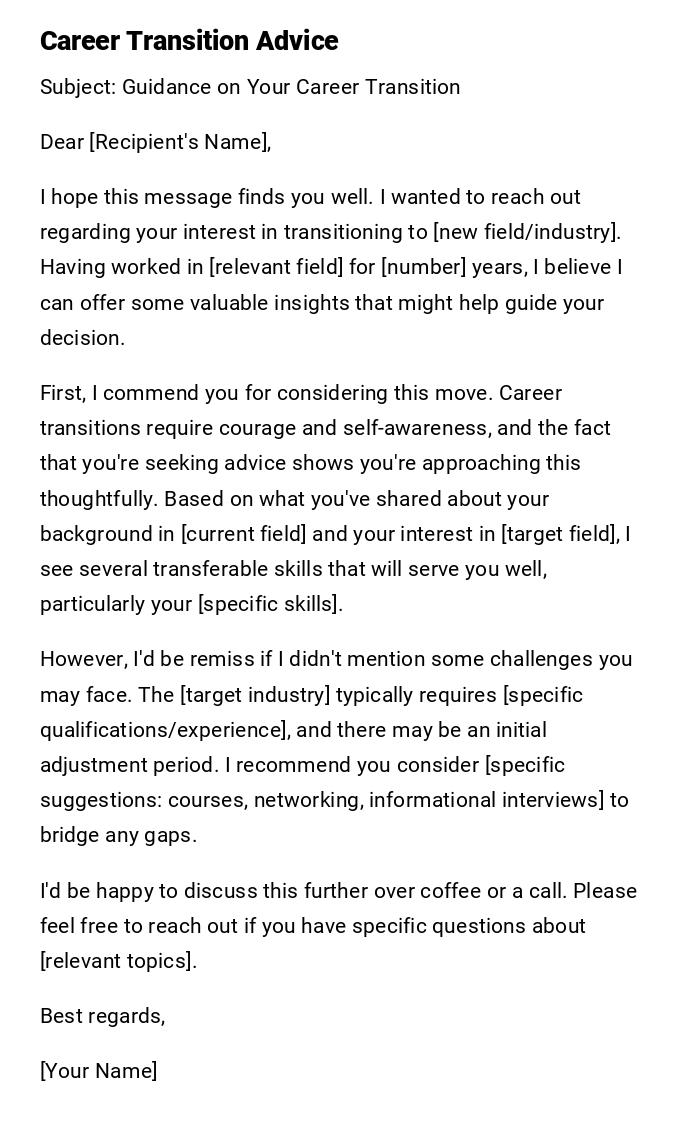
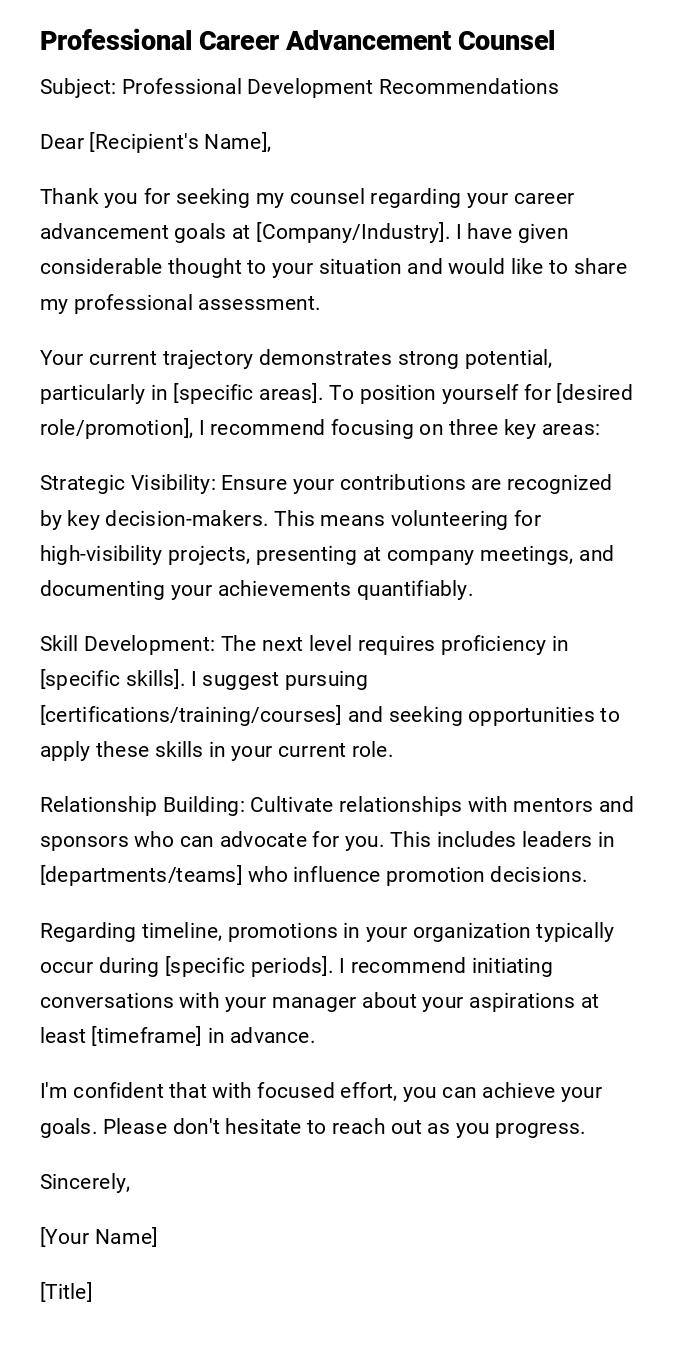
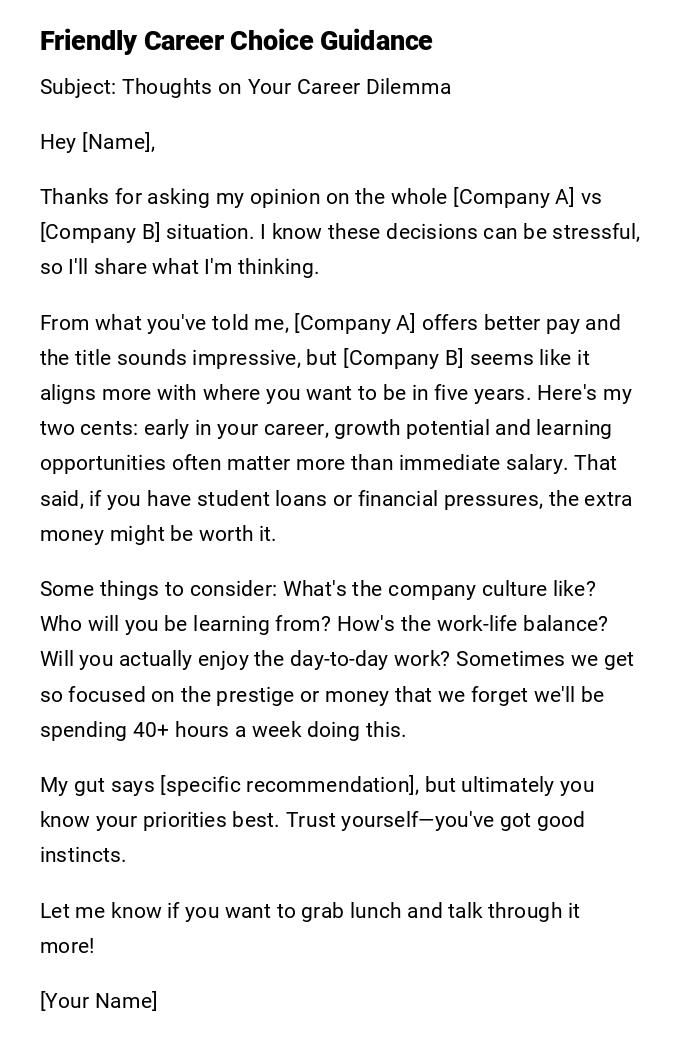
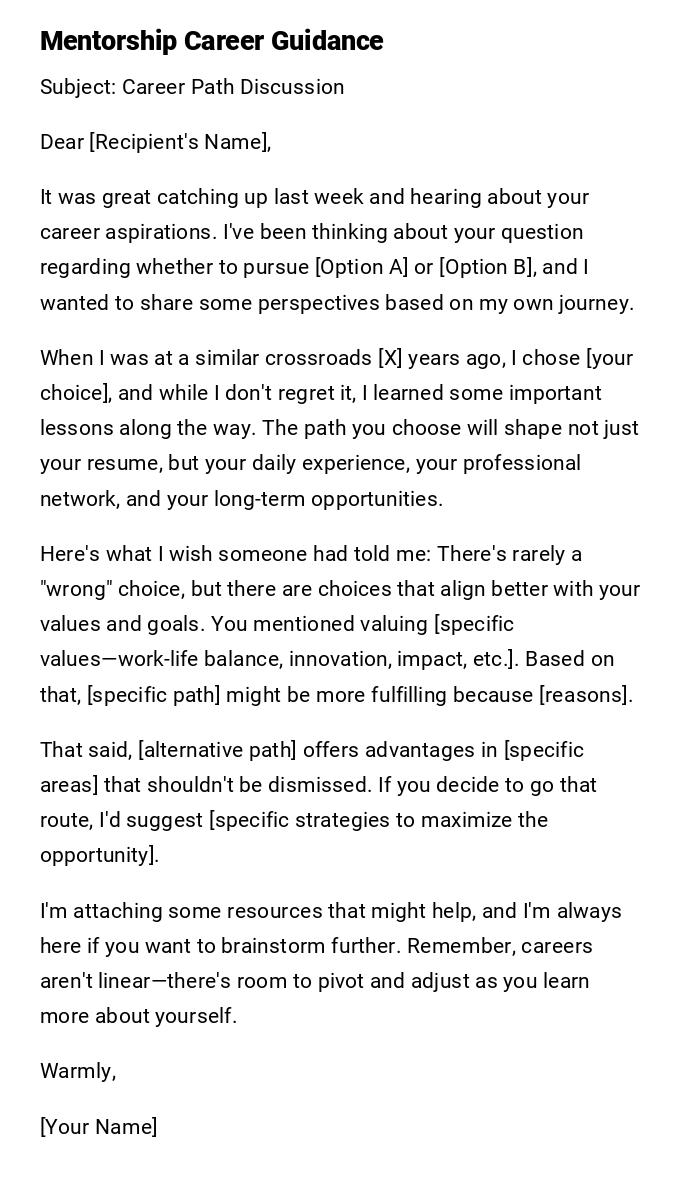
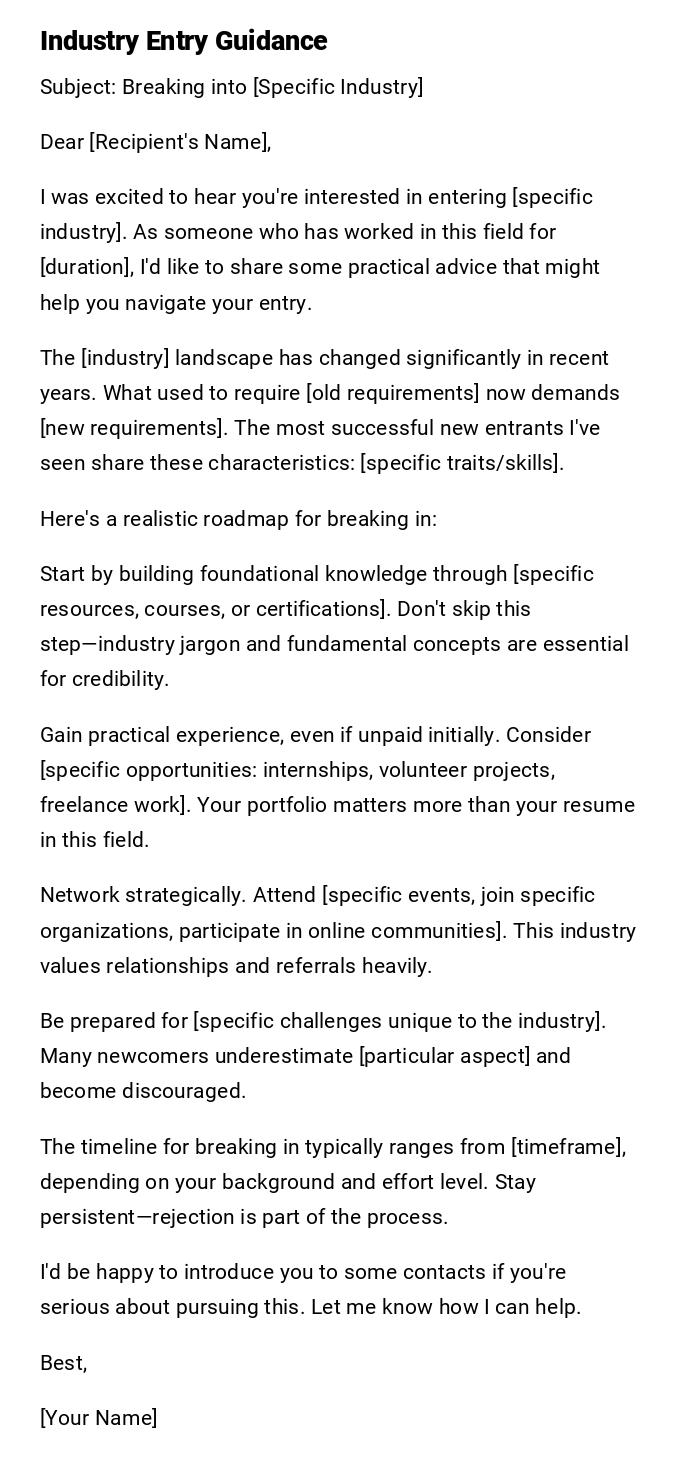
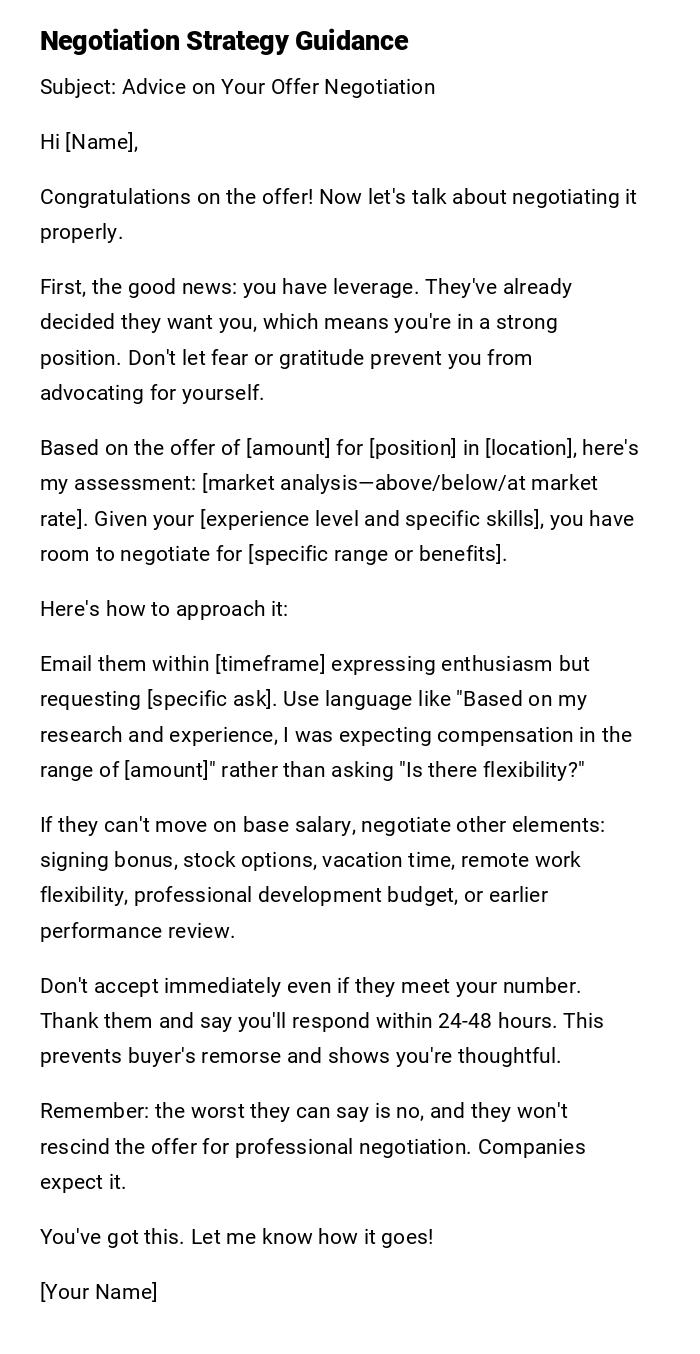
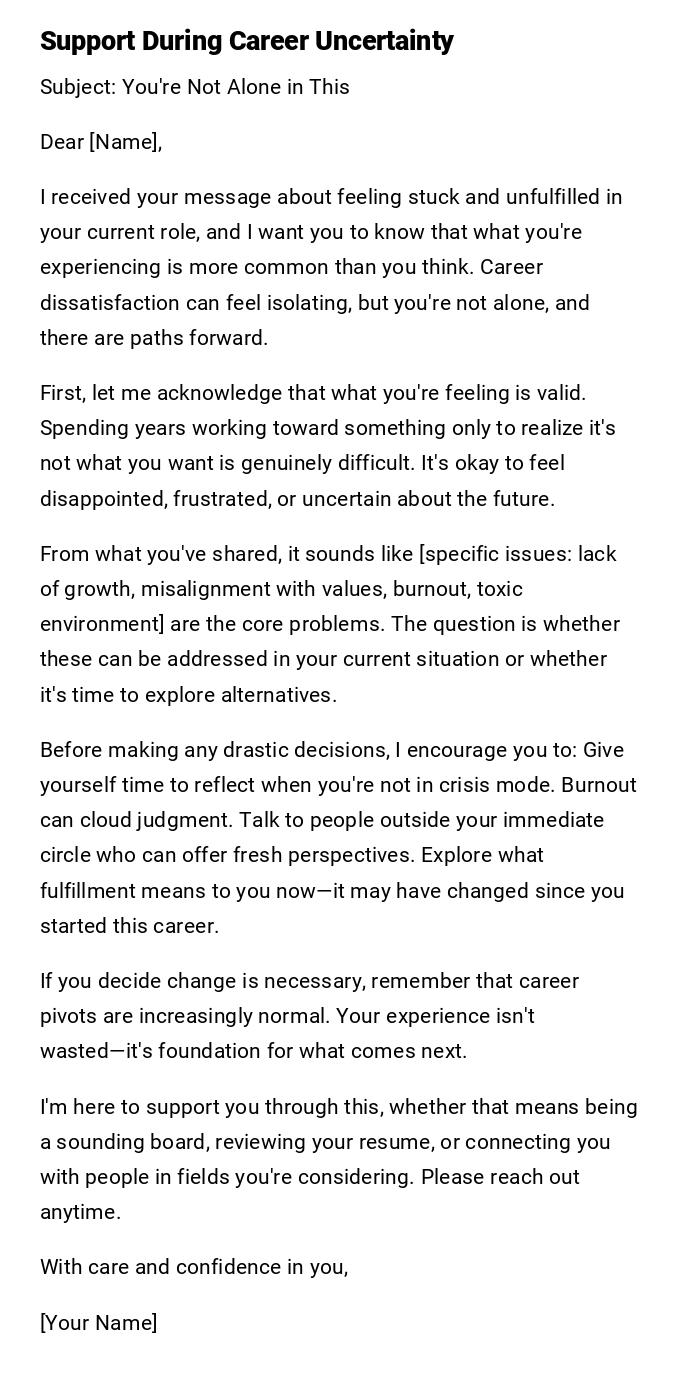
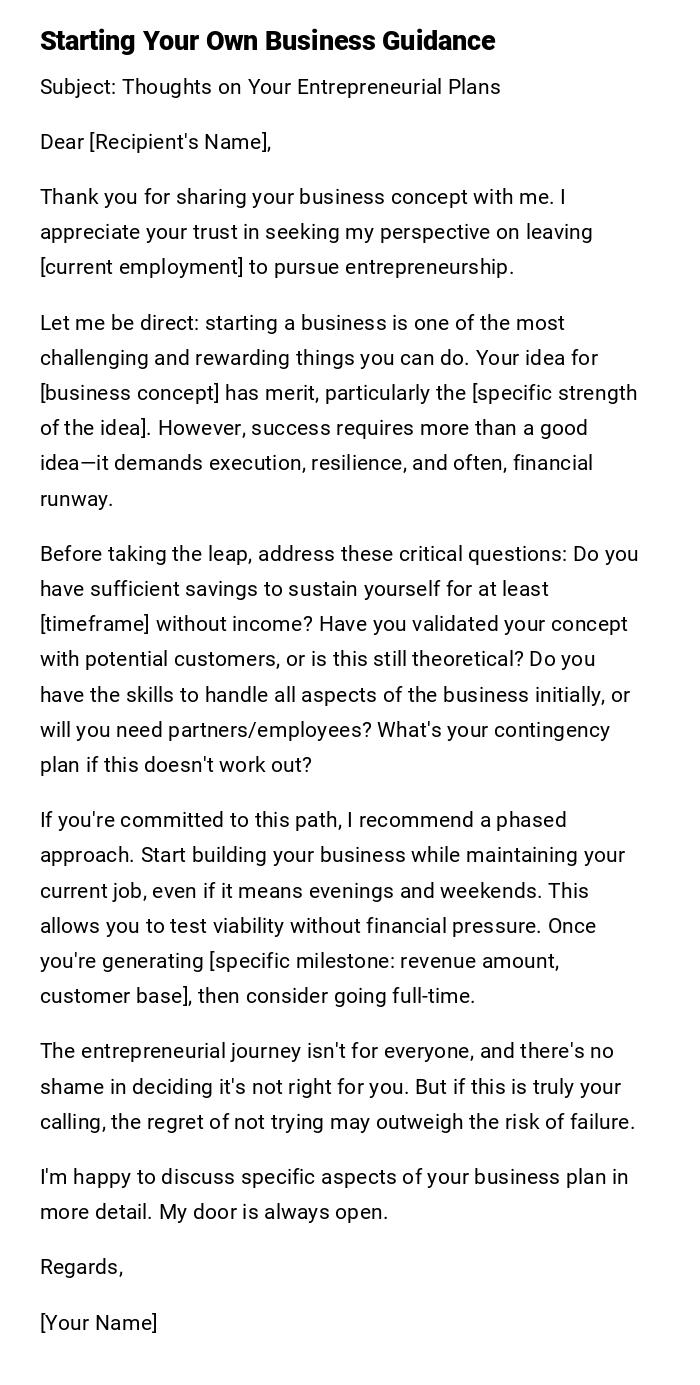

 Download Word Doc
Download Word Doc
 Download PDF
Download PDF